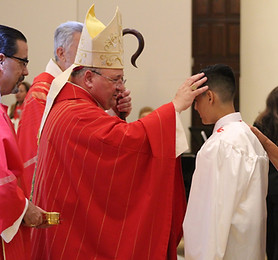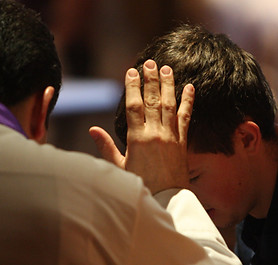

Sacramentos
There are seven sacraments in the Church: Baptism, Confirmation, Eucharist, Reconciliation, Anointing of the Sick, Priestly Order and Marriage (cf. DS 860; 1310; 1601). The entire liturgical life of the Church revolves around the Eucharistic Sacrifice and the sacraments (cf. SC 6). (Conf CIC 1113) The sacraments are "of the Church" in the double sense that they exist "for her" and "for her". They exist "for the Church" because she is the sacrament of the action of Christ that acts in her thanks to the mission of the Holy Spirit. And they exist "for the Church", because they constitute the Church since they manifest and communicate to the people of God the mystery of the Cocmunion of God Love, (CCC 1118) The sacraments are effective signs of grace, instituted by Christ and entrusted to the Church by which the divine life is dispensed to us. The visible rites under which the sacraments are celebrated signify and perform the proper graces of each sacrament. They bear fruit in those who receive them with the required provisions. (CIC 1131). The fruit of the sacramental life is both personal and ecclesial. On the one hand, this fruit is for all faithful the life for God in Christ Jesus: on the other hand, it is for the Church growth in charity and in its mission of witness (CIC 1134)
Batismos
O santo Batismo é o fundamento de toda a vida cristã, o pórtico da vida no espírito ("vitae spiritualis ianua") e a porta que abre o acesso aos outros sacramentos. Por meio do Batismo somos libertados do pecado e regenerados como filhos de Deus, nos tornamos membros de Cristo e somos incorporados à Igreja e nos tornamos participantes de sua missão. (Catecismo da Igreja Católica, 1213)
Requisitos para a recepção do Batismo em nossa paróquia
Confirmações
Aos batizados "o sacramento da Confirmação os une mais intimamente à Igreja e os enriquece com uma força especial do Espírito Santo. Deste modo, eles são ainda mais obrigados, como testemunhas autênticas de Cristo, a difundir e defender a fé com suas palavras e obras" (Catecismo da Igreja Católica, 1285).
Instruções para a recepção da Confirmação na nossa paróquia
Eucaristia
Nosso Salvador, instituiu o Sacrifício Eucarístico do seu corpo e sangue para perpetuar pelos séculos, até a sua volta, o sacrifício da cruz e assim confiar à Igreja, o memorial da sua morte e ressurreição, sinal de unidade, vínculo de amor, no qual, acolhido Cristo, a alma é cheia de graça e dada penhor de glória futura.» (Catecismo da Igreja Católica, 1323).
Instruções para a recepção da Primeira Comunhão em nossa paróquia
Para mais informações sobre requisitos, cursos,
disponibilidade de ministros e datas, ligue para o escritório paroquial.
Confessions
"O Senhor Jesus Cristo, médico das nossas almas e dos nossos corpos, que perdoou os pecados do paralítico e restaurou a saúde do corpo (cf. Mc 2, 1-12), quis que a sua Igreja continuasse, na força do Espírito Santo, a sua obra de cura e de salvação, também nos seus próprios membros. É esta a finalidade dos dois sacramentos de cura: do sacramento da Penitência e da Unção dos Enfermos." (Catecismo da Igreja Católica, 1421)
Orientação para fazer uma boa confissão
Casamentos
Os protagonistas da aliança matrimonial são um homem e uma mulher batizados, livres para contrair matrimônio e expressar seu consentimento. (Catecismo da Igreja Católica, 1625) O ministro que assiste à celebração do Matrimônio recebe o consentimento dos esposos em nome da Igreja e dá a bênção. A presença do ministro da Igreja expressa que o Matrimônio é uma realidade eclesial. (Catecismo da Igreja Católica, 1630).
Instrução para a recepção do sacramento do matrimônio em nossa paróquia
Anointing of the Sick
The Anointing of the Sick "is not a sacrament only for those who are about to die. That is why it is considered opportune time to receive it when the faithful begin to be in danger of death due to illness or old age ". (Catechism of the Catholic Church, 1514) It is appropriate to receive the Anointing of the sick before an important operation. And this same can be applied to the elderly whose strength weakens "(Catechism of the Catholic Church, 1515).
General guidelines on the sacrament of the Anointing of the Sick





_svg.png)

.jpg)
.png)






